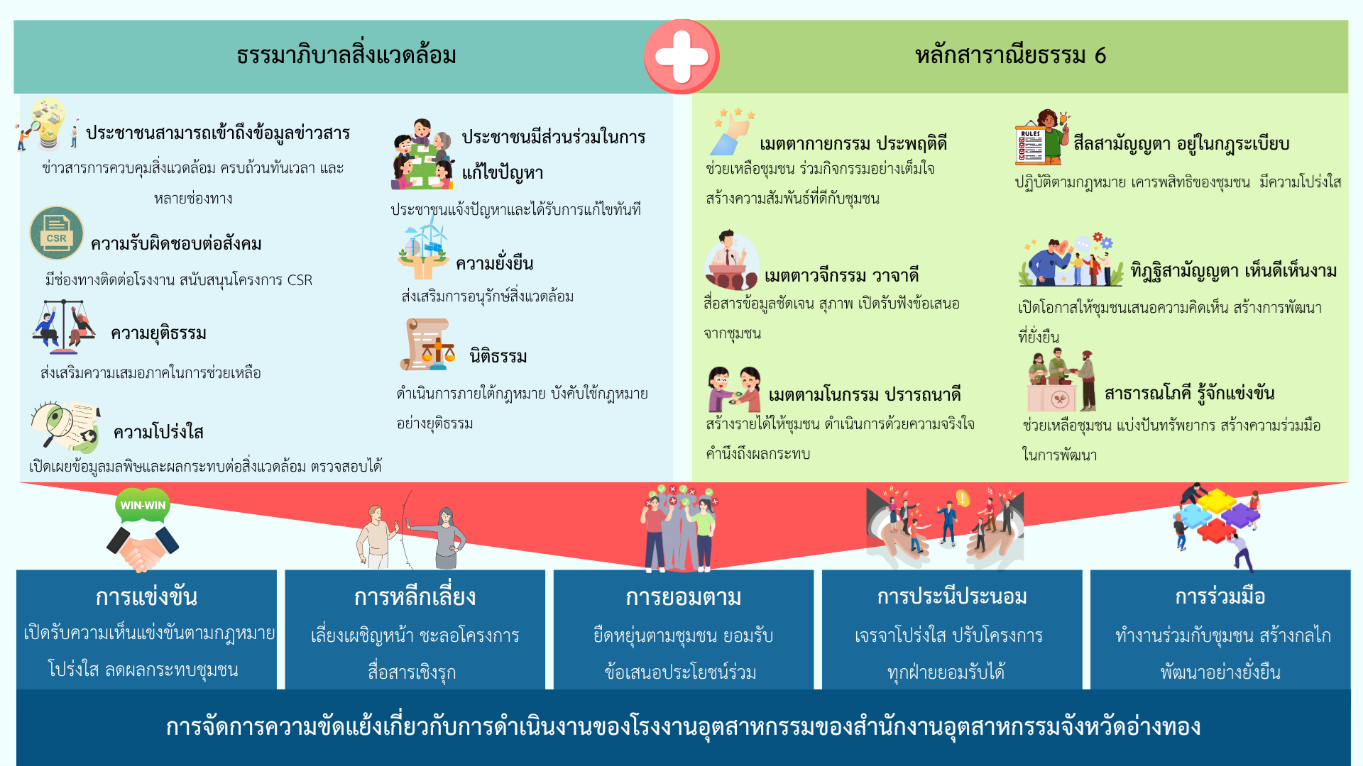BUDDHADHAMMA GOVERNANCE FOR MANAGING INDUSTRIAL PLANTS OPERATION CONFLICT OF ANG THONG PROVINCIAL INDUSTRIAL OFFICE
Keywords:
Buddhadhamma Governance, Conflict Management, Industrial PlantsAbstract
The objectives of this research paper are 1. to study conflict management, 2. to study the factors that affect conflict management. 3. Presenting Buddhist Governance for Conflict Management on the Operation of Industrial Factories of the Ang Thong Provincial Industrial Office Conduct research in an integrated manner by quantitative research. Data were collected from a sample of 387 people, using a questionnaire with a confidence value of 0.891, analyzed with descriptive statistics, procedural multiplier regression analysis, and qualitative research based on in-depth interviews with 18 key informants or people, divided into 5 groups. 10 photos or people to confirm the results of the study.
The research findings revealed that: 1. Conflict management concerning industrial factory operations at the Ang Thong Provincial Industry Office was, by overall, at a moderate level (=3.24, S.D.=0.91) . This included aspects of collaboration, competition, avoidance, compromise, and accommodation. 2. Factors influencing conflict management related to industrial factory operations at the Ang Thong Provincial Industry Office showed that five aspects of environmental governance (rule of law, social responsibility, sustainability, fairness, and public participation in problem-solving) had a statistically significant impact at the 0.01 level. Furthermore, the six principles of Saraniya Dhamma (kindness in thought, equal observance of precepts, equal views, kindness in action, good conduct, and kindness in speech) also significantly impacted conflict management across all six aspects at the 0.01 statistical significance level. 3. Buddhist governance for conflict management concerning industrial factory operations at the Ang Thong Provincial Industry Office was found that environmental governance integrated with the six principles of Saraniya Dhamma influenced conflict management in the following ways: public access to information, public participation in problem-solving, transparency, social responsibility, rule of law, fairness, and sustainability.
References
กฎกระทรวง แบ่งส่วนราชการสำนักงานปลัดกระทรวง กระทรวงอุตสาหกรรม พ.ศ. 2560. (2560, 2 ตุลาคม). ราชกิจจานุเบกษา. 134 ตอนที่ 102 ก. หน้า 14.
กรมโรงงานอุตสาหกรรม. (ม.ป.ป.). บริการข้อมูล ข้อมูลโรงงาน ค้นหาโรงงานอุตสาหกรรม. สืบค้น 22 มีนาคม 2567, จาก https://www.diw.go.th/
โครงการส่งเสริมธรรมาภิบาล สิ่งแวดล้อมในสถานประกอบการอุตสาหกรรม. (2553). คู่มือการดำเนินงานตามหลักเกณฑ์ธรรมาภิบาลสิ่งแวดล้อม. กรุงเทพฯ: กระทรวงอุตสาหกรรม.
ชูวงศ์ อุบาลี. (2558). ศึกษาการจัดการความขัดแย้งระหว่างกลุ่มผู้นำในชุมชนท้องถิ่น : กรณีศึกษาเขตพื้นที่ตำบลตะเคียนทองอำเภอเขาคิชฌกูฏ จังหวัดจันทบุรี. วารสารการเมืองการปกครอง, 5(1), 181-195.
ทิตาวีร์ เทศะปุรณะ. (2564). การมีส่วนร่วมของชุมชนในกิจกรรมความรับผิดชอบต่อสังคมของโรงงานอุตสาหกรรมขนาดเล็ก. วารสารสันติศึกษาปริทรรศน์ มจร, 9(5), 2039–2050.
รวิภัทร ประภานัน. (2565). รูปแบบการส่งเสริมจริยธรรมเชิงพุทธของผู้ประนีประนอมศาลอาญา (ดุษฎีนิพนธ์ปริญญาปรัชญาดุษฎีบัณฑิต สาขาวิชารัฐประศาสนศาสตร์). พระนครศรีอยุธยา: มหาวิทยาลัยมหาจุฬาลงกรณราชวิทยาลัย.
ราชบัณฑิตยสถาน. (2554). พจนานุกรมฉบับราชบัณฑิตยสถาน พ.ศ. 2554. สืบค้น 5 ตุลาคม 2567, จาก https://dictionary.orst.go.th/
สำนักงานอุตสาหกรรมจังหวัดอ่างทอง. (ม.ป.ป.). 01 เกี่ยวกับสำนักงาน อำนาจหน้าที่. สืบค้น 22 มีนาคม 2567, จาก https://angthong.industry.go.th/
สุรวุฒ ณ ระนอง. (2566). พุทธบูรณาการเพื่อส่งเสริมการบริหารจัดการของสมาคมสถาปนิกสยามในพระบรมราชูปถัมภ์ (ดุษฎีนิพนธ์ปริญญาปรัชญาดุษฎีบัณฑิต สาขาวิชารัฐประศาสนศาสตร์). พระนครศรีอยุธยา: มหาวิทยาลัยมหาจุฬาลงกรณราชวิทยาลัย.
อภิมุข เสมสฤษดิ์. (2567). พุทธบูรณาการเพื่อเสริมสร้างประสิทธิผลการบริหารงานของสถานีตำรวจภูธรในจังหวัดพระนครศรีอยุธยา (ดุษฎีนิพนธ์ปริญญาปรัชญาดุษฎีบัณฑิต สาขาวิชารัฐประศาสนศาสตร์). พระนครศรีอยุธยา: มหาวิทยาลัยมหาจุฬาลงกรณราชวิทยาลัย.
อรัญ พันธุมจินดา. (2566). ธรรมาภิบาลเพื่อการบริหารราชการแผ่นดินในสถานการณ์ฉุกเฉินของไทย (ดุษฎีนิพนธ์ปริญญาปรัชญาดุษฎีบัณฑิต สาขาวิชารัฐประศาสนศาสตร์). พระนครศรีอยุธยา: มหาวิทยาลัยมหาจุฬาลงกรณราชวิทยาลัย.
Likert, R. (1967). The Method of Constructing and Attitude Scale. In Reading in Attitude Theory and Measurement. New York: Wiley & Son.
Thomas, K. W., & Kilmann, R. H. (1974). Thomas-Kilmann Conflict Mode Instrument. Mountain View, CA: CPP, Inc.
Yamane, T. (1973). Statistic: An Introductory Analysis (3rd Ed.). New York: Harper and Row.







